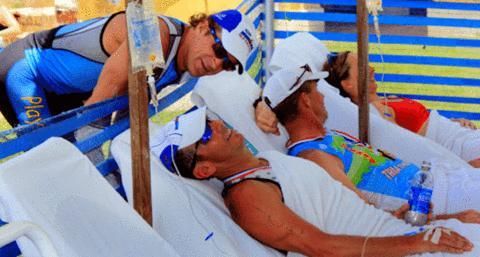Not all that long ago, the prevailing opinion in sports science was that you needed to replace 100% of your sweat losses to maintain your performance when exercising.
That would imply that during an Ironman, ultra-running race or long sportive, some athletes should be aiming to drink as much as 64-96oz an hour! That’s a hell of a lot of drinking. In fact, it’s beyond what is physically possible for most people.
The general “drink, drink, drink” marketing messages coming from the sports drink industry in the 1980s/90s has been blamed for driving the worrying increase in cases of hyponatremia (ill health - or even death in extreme cases - caused by the over-consumption of fluid) seen in amateur sports. In fact, a study conducted at Ironman Frankfurt a few years ago found that as many as 10% of finishers had hyponatremia to some extent, which will have impacted their performance at best.
Aiming to replace all of your sweat losses during exercise is unnecessary. In fact, trying to do so could lead to an increased risk of hyponatremia which is bad for your performance and health.
Most amateur athletes can finish an ultra distance event whilst experiencing a measurable degree of weight loss. There are very few examples of athletes losing more than 10% bodyweight after finishing events under their own steam. The sweet spot is likely to be highly individual and may even be slightly different for the same athlete on different days and in different climates. But, it probably falls somewhere between 2-4% bodyweight loss for most athletes.
There’s also highly likely to be a great deal of difference in the level of dehydration one athlete can tolerate to the next.
You may be able to tolerate a reasonable amount of dehydration but it’s definitely worth actively trying to maintain a good hydration status. Sodium helps you retain fluid in your bloodstream, which is useful when your sweat output is high.
Researchers in Spain looked at fluid and sodium intake during a hot half-Ironman event in 2015. Their data showed that athletes who took in more sodium tended to lose less bodyweight in percentage terms than a control group who only took a placebo.
The group that took the sodium in (and so maintained a better hydration status) outperformed those taking the placebo by an average of 26 minutes in the race. There seemed to be a clear and positive correlation between increased performance and losing less bodyweight overall by using sodium supplementation to absorb and retain more fluid.
If you want to know exactly how much sodium you’re losing in your sweat so you can more accurately replace a decent % of what you’re losing, it’s worth considering taking our new Sweat Test. We’ll fully personalize your hydration strategy, giving you the knowledge and tools you need to stay hydrated so you can perform at your best.

